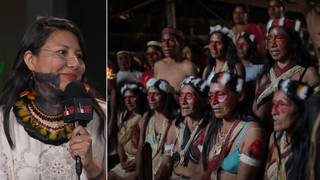
Guests
- Roxanne Dunbar-Ortizauthor of An Indigenous Peoples’ History of the United States and co-author of All the Real Indians Died Off: And 20 Other Myths About Native Americans.
As much of the United States prepares to mark Thanksgiving this weekend, many Native Americans will gather in Plymouth to commemorate the 47th National Day of Mourning. This year is dedicated to water protectors at Standing Rock and to the struggle for recognition of Indigenous Peoples’ Day. To discuss this and more, we speak with indigenous historian and activist Roxanne Dunbar-Ortiz. She is the author of “An Indigenous Peoples’ History of the United States” and co-author of “All the Real Indians Died Off: And 20 Other Myths About Native Americans.”
Transcript
NERMEEN SHAIKH: As much of the United States prepares to mark Thanksgiving this weekend, many Native Americans will gather in Plymouth to commemorate the 47th National Day of Mourning. This year is dedicated to water protectors at Standing Rock and to the struggle for recognition of Indigenous Peoples’ Day. To discuss this and more, we’re joined in San Francisco by indigenous historian and activist Roxanne Dunbar-Ortiz. She’s the author of An Indigenous Peoples’ History of the United States and co-author of All the Real Indians Died Off: And 20 Other Myths About Native Americans.
Welcome back to Democracy Now!, Roxanne. Could you tell us, as the nation prepares to observe Thanksgiving, a national holiday ostensibly meant to honor Native people, what are your thoughts?
ROXANNE DUNBAR-ORTIZ: Well, thank you for having me on the show.
Actually, it’s never been about honoring Native Americans. It’s been about the origin story of the United States, the beginning of genocide, dispossession and constant warfare from that time—actually, from 1607 in Jamestown—until the present. It’s a colonial system that was set up.
There’s a sort of annual calendar for this origin story, beginning with Columbus, October 12. Why celebrate Columbus? It was the onset of colonialism, the slave trade and dispossession of the Native people of the Americas. So, that is celebrated with a federal holiday. That’s followed then by Thanksgiving, which is a completely made-up story to say the Native people welcomed these people who were going to devastate their civilizations, which is simply a lie. And then you go to Presidents’ Days, the Founding Fathers, in February, and celebrate these slaveowners, Indian killers. George Washington headed the Virginia militia for the very purpose of killing Native people on the periphery of the colony, before, you know, when it was still a Virginia colony. And then we have the big day, the fireworks, July 4th, independence, which is probably the most tragic event in world history, because it gave us—it gave the world a genocidal regime under the guise of democracy. And that’s really the—I’m a historian, so that’s the historical context that I think we have to see Thanksgiving in, that it is a part of that mythology that attempts to cover up the real history of the United States.
It actually—when it was introduced as a holiday by Abraham Lincoln during the Civil War, there was no mention of pilgrims and Native people or food or pumpkins or anything like that. It was simply a day for families to be together and mourn their dead and be grateful for the living. And I think that’s an appropriate holiday, that—how people should enjoy it. But they should take Native Americans and Puritans out of the picture for it to be a legitimate holiday of feast and sharing with family and friends.
So, that’s—you know, the people at Plymouth, I send greetings to them. They have, for many years—I think it’s almost 40 years now—stood up and testified to the lie of Plymouth Rock, the Mayflower, the pilgrims. And this is very hard for people to give up. This is the national—nationalism. It’s actually—Americanism is white supremacy and represents negative things. There’s almost no way to reconcile it. It simply has to be deconstructed and faced up to; and, otherwise, there will be no social change that’s meaningful for anyone.
NERMEEN SHAIKH: Roxanne Dunbar-Ortiz, thank you so much for joining us, indigenous historian and activist.
That does it for today’s show. Tune in tomorrow for our Standing Rock special.












Media Options